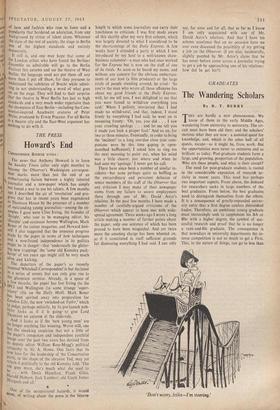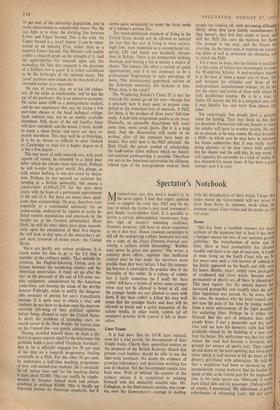GRADUATES
The Wandering Scholars
By R. T. BERRY
TrTHEY are hardly a new phenomenon. We I know of them in the early Middle Ages, wandering from university to university. The cir- cuit must have been old then; and the scholars' motives what they are now: a nominal quest for knowledge, and, which is the other half of all quests, escape—as it might be, from work. But the opportunities were never so extensive and so brilliant as today. Post-graduate students form a large, and growing, proportion. of the population. Who ire these people, and what is their circuit?
The need for post-graduate students is rooted in the considerable expansion of research ac- tivity in recent years. This need has perhaps two important aspects. From above, the demand for researchers sucks in large numbers of the best graduates. From below, the best graduates need to distinguish themselves from the others. It is a consequence of greatly-expanded univer- sity entry that a first degree confers diminished kudos. Therefore, an ambitious young graduate must increasingly seek to supplement his BA or BSc with a higher degree, the symbol of suc- cessful research and proof that he is no longer a rank-and-file graduate. The consequence is that nowadays in university departments the in- tense competition is not so much to get a First. This, in the nature of things, can go to less than
'Don't worry, folks—I'm steering.'
10 per cent of the university population, and in many departments to considerably fewer. No, the real fight is to cross the dividing line between Lower and Upper Second. This is•the crux. An Upper Second is a 'good' degree; it can be repre- sented as an unlucky First, rather than •as a superior Lower Second. The Ministry will readily confer a research grant on the strength of it. And the opportunities for research open out; for nowadays the idea that research is the province of a brilliant few is passé. It is rather considered to be the birthright of the talented many. The 'good' graduate now stands on the threshold of an extended career as a researcher.
He can, of course, stay on at his old univer- sity. If the niche is comfortable, and he has the ear of the professor, this is an attractive prospect. He earns some £500 as a post-graduate student, and he can supplement this, say, by taking a few part-time classes at the local technical college. Such contacts may not be so readily available elsewhere. Still, many, of the old familiar faces will have vanished; and the wisest, I think, decide to make a clean break, and carry out their re- search elsewhere. This may well be at Oxbridge. ,It is by no means so difficult to enter Oxford or Cambridge to read for a higher degree as it is for a first degree.
The two years of such research can, with good reports all round, be extended to a third year. After which the scholar must take stock. Perhaps he will re-enter the great world; this plunge, as with winter bathing, is one not eased by hesita- tion. Perhaps he has secured an assistant lec- tureship at a British university; this means a comfortable £1,050-£1,275 for the next three years, with the hope of a permanent appointment at the end of it. But there are many more appli- cants than assistantships. He may, therefore, turn hopefully to a continental university for an assistantship, undeterred by reports of vastly in- flated student populations and overwork by the faculty (as at the German universities). More likely, he will do what others have done immedi- ately upon the completion of their first degree. He will look to that area of the researcher's cir- cuit most favoured of recent years: the United States.
There are hardly any serious problems. It is much easier for him to go to the US than a member of the ordinary public. That amiable in- stitution, the English-Speaking Union, acts as liaison between the wandering scholar and the American universities. A fund, set up after the war on the proceeds of the sale of US army sur- plus equipment, administered by the American authorities, and bearing the name of the worthy Senator Fulbright, exists to nullify the disagree- able necessity of paying for one's transatlantic passage. It is quite easy to obtain a visa; and students do not have to declare even the most ex- cessively left-wing of their political opinions before being allowed to enter the United States. In short, the problems of extending one's re- search career to the New World—by tourist class on the Cunard line—are purely administrative.
Having installed himself there, he finds a life that is in many respects ideal for the lotus-eater. He probably holds a post called 'Graduate Assistant': that is, he is officially engaged for 50 per cent of his time on a research programme, leading eventually to a PhD. For the other 50 per cent, he undertakes a half-time teaching programme of first- and second-year students. He is normally let off tuition fees; and for his teaching duties is paid about $2,000. This can readily be supple- mented by Summer School work and private coaching to perhaps $3,000. This is hardly an iinposing income by American standards, but it serves quite adequately to cover the basic needs of a scholar's private life.
The much-publicised standard of living in the United States should not be allowed to conceal the fact that the cost of living is often surpris- ingly low; such essentials as a second-hand car, petrol, LPs and liquor are decidedly cheaper than in Britain. There is no comparable hoasing shortage, and renting a flat is merely a matter of choice. The campus life offers a variety of social opportunities, and it is not necessary to be a professional Englishman to take advantage of them. The international paperback culture of the American university life beckons to him. What, then, is the catch?
The Wandering Scholar's Catch 22 is that the research life cannot go on for ever—though that is precisely how it must seem to anyone com- mitted to the American way of research. A PhD, for them, is theproduct of three years' full-time study. A half-time programme points to six years. Naturally, an amenable department will remit some time, some credit hours. But it is a long haul. And the dissertation still needs to be written, after all the seminars have been at- tended. Not until then is the PhD attained: the Holy Grail, the purest symbol of scholarship, the trade-union ticket without which no Ameri- can assistant professorship is possible. Therefore one sees in the American universities the ultimate, refined type of the post-graduate student. Such people are fending off, with increasing difficultY, thirty; often thty have family commitments; if they haven't, they feel they ought to have; and still the PhD lies over the horizon for them. The present is too easy, and the future too exacting. As the years pass, it requires an increa5. ing effort of will to surmount the obstacles, and to clinch the PhD.
Yet it must be done, else the failure is manifest. It is this sense of failure that increasingly troubles the Wandering Scholar. A post-graduate student is at the best of times a queer sort of beast. The gulf between his attitudes and those of his undergraduate acquaintances widens; yet he has not the salary and status of those with whom be feels intellectual kinship. He is in a kind of limbo. Of course, the life is a congenial one; and it may involve less real work than almost anY other.
Yet surprisingly few people have a genuine talent for loafing. They may think so, but theY are deceived. Puritanism will out. Sooner or later, the scholar will have to re-enter society. He maY do so abroad, or he may return. He may brandish a PhD—in which case he may have to convince the home authorities that it was really worth doing anyway—or he may return with nothing but his shame and the odd hits. In any event, it will signalise his surrender to a kind of reality he has shunned for many years. It has been a good innings; now it is over.































 Previous page
Previous page